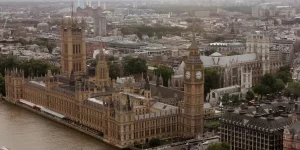Achieving net zero emissions in the UK by 2050 is one of the Government’s top policy goals. Decarbonising transport will be difficult, with aviation presenting perhaps the biggest challenge. In 2019, aviation accounted for 38.2 megatonnes of CO2 equivalent (MtCO2e).[1] Reducing these emissions, as with any sector, will require a great deal of effort, funding and planning.
Jet Zero Strategy Summary
The Government has admitted that aviation will present one of the largest sources of residual greenhouse gas emissions in 2050, and these emissions will need to be offset.[2] Nonetheless, the Government has set a target of reducing aviation emissions to 19.3MtCO2e by 2050, a reduction of almost half compared to pre-Covid emissions from the sector.[3]
To meet this challenge, in July 2022, the Government introduced its strategy to decarbonise aviation, called the Jet Zero Strategy. The Strategy focusses on six policy measures:[4]
- System efficiencies, including improved efficiency of aircraft and airspace modernisation
- Sustainable aviation fuels
- Zero emission flight
- Markets and removals
- Influencing consumers
- Addressing non-CO2
Decarbonising flight presents two particular challenges compared to other sectors.
Reliance on Unproven Technologies
Firstly, unlike some other sectors such as power or road transport, the Jet Zero plan relies on technology that is currently commercially unviable, or does not exist. If the 2050 net zero target is to be met, the Government’s plan requires delivery of sustainable aviation fuels (SAF) and zero emission flights (ZEF).
The Jet Zero Strategy assumes 50 per cent uptake of SAF by 2050, resulting in 9 MtCO2e savings.[5] SAF made from low-carbon feedstocks can be blended with conventional jet fuel and achieves lifecycle emission savings of over 70 per cent when fully replacing fossil fuels. However, SAF usage is currently very low, with only 26 million litres supplied to the UK in 2022.[6] This compares to an annual aviation fuel consumption of over 10 billion litres.[7] To address this shortfall and increase the production and consumption of SAF, the Government is currently consulting on an SAF Mandate, which would require 10 per cent of jet fuel to be made from sustainable feedstocks by 2030.[8] Even with this Mandate, considerable further investment from both Government and industry will be required to increase production of SAF and roll out its use across the sector if the Jet Zero Strategy’s targets are to be met.
The Jet Zero Strategy assumes ZEF, using electric or hydrogen-powered aircraft, will reduce emissions by 2 MtCO2e by 2050, under its ‘high ambition scenario’.[9] However, this technology is even less developed than SAF. In November 2022, Rolls-Royce and easyJet ran a successful ground test of an aircraft engine using hydrogen.[10] In January 2023, ZeroAvia conducted the first successful UK flight of a 19-seater aircraft with one of the two engines running on hydrogen fuel cells.[11] These achievements, whilst significant, demonstrate that the technology is still in its early stages, and neither hydrogen nor battery-powered aircraft propulsion is yet viable on a scale anywhere near to the demand for flights. As with SAF, the Government will have to invest large sums of funding for this technology to be commercially viable, with the added challenge that ground infrastructure will have to be changed to allow for electric aircraft.
With its reliance on SAF and ZEF to meet its net zero goals, the Government is expecting that innovation will be able to deliver emission reductions, and sustained funding, research and support for both SAF and ZEF will be required to meet the 2050 net zero goal.
Demand Reduction
Secondly, the Government’s plans for decarbonisation of flight will likely lead to demand reduction, i.e. fewer flights. In the Jet Zero plan, the Government acknowledged that some stakeholders wished to see ‘demand management measures’, such as a cap on the number of flights, but refused to introduce these, citing knock-on economic and social effects.[12] However, in the Net Zero Carbon Road-Map, produced by Sustainable Aviation, an industry body working to reduce aviation emissions, a reduction in projected aviation activity of 14 per cent is forecast by 2050 because of the costs of decarbonisation.[13] In other words, flights will be more expensive, and British consumers will take less of them due to the cost.
Unlike some other sectors, such as heating, net zero aviation will make consumers noticeably worse off than they otherwise would be, which may prove unpopular with the electorate, and to some extent undermines the Government’s message in the Net Zero Strategy that decarbonisation will not require any sacrifices.[14]
The Labour Party supports the goal of decarbonising aviation, but some Labour MPs have criticised the details of the Government’s plan. In 2021, the Shadow Minister for Green Transport, Kerry McCarthy MP,[15] criticised the Government’s dependence on offsetting to meet the sector’s net zero target, and called for demand reduction measures to be introduced, such as a frequent flyer levy or a ban on expansion of Heathrow Airport, instead. Whilst this would reduce the pressure on unproven or unspecified technologies to succeed, once the reality of more expensive or more difficult air travel becomes known, along with the associated social and economic costs, any Labour Government may face a public backlash.
For both technological and societal reasons, governments from any political party will face a tough battle to decarbonise aviation. Therefore, organisations should be active in this space to present their solutions and proposals to help achieve this goal.
BREVIA CONSULTING PROVIDES STRAIGHTFORWARD POLITICAL ADVICE AND SUPPORT TO BUSINESSES AND ORGANISATIONS
Discover how Brevia can help you and your organisation by contacting the Brevia Team on 020 7091 1650 or contact@brevia.co.uk
[1] Department for Transport, Jet Zero Strategy, 19 July 2022, p.16, link
[2] Department for Transport, Jet Zero Strategy, 19 July 2022, p.7, link
[3] Department for Transport, Jet Zero Strategy, 19 July 2022, p.8, link
[4] Department for Transport, Jet Zero Strategy, 19 July 2022, p.25, link
[5] Department for Transport, Jet Zero Strategy, 19 July 2022, p.39, link
[6] Department for Transport, Pathway to net zero aviation: developing the UK sustainable aviation fuel mandate, 30 March 2023, p.6, link
[8] Department for Transport, Pathway to net zero aviation: developing the UK sustainable aviation fuel mandate, 30 March 2023, p.6, link
[9] Department for Transport, Jet Zero Strategy, 19 July 2022, p.16, link
[10] Rolls -Royce, Rolls-Royce and easyJet set new world first, 28 November 2022, link
[11] Sustainable Aviation, Net Zero Carbon Road-Map Summary Report, 17 April 2023, p.11, link
[12] Department for Transport, Jet Zero Strategy, 19 July 2022, p.10, link
[13] Sustainable Aviation, Net Zero Carbon Road-Map Summary Report, 17 April 2023, p.19, link
[14] HM Government, Net Zero Strategy: Build Back Greener, 19 October 2021, p.9, link
[15] John McDonnell MP, Hansard, 21 September Col. 70WH, link




